A look back at some of the words that defined 2010.
It’s the time of year for retrospective sentimentality, and looking back wistfully (or perhaps angrily, depressingly, joyfully, or indifferently) at the year that’s coming to an end, while exchanging vacuous statements about how “time flies”. My Twitter feed has been dizzied by a seemingly endless stream of “best photos of the year” links from every media outlet / blog / website there is, keen as they are to attract the millions of clicks of the sentimental masses.
Photo collections seem to get forwarded, retweeted, or linked to the most — a picture speaks a thousand words and all that jazz. But that cliche doesn’t do justice to words. Whilst it is rare for photos to brand themselves into our collective psyche (with the exception of rare, iconic, epoch-defining snaps), words have a way of sneaking in through the backdoor. Stealthily, they become a part of our language, our culture, and a barometer of the times in which we live.
According to Google’s Zeitgeist 2010 summary, Malaysians were most excited about… the Proton Inspira — er, there’s something not quite right there.
So, what then are some of the words that defined 2010? Before getting into that, here’s a Sid Lowe style caveat — the problem with selecting a handful, twenty, or even a hundred words that define any period of time is that the number of words that could be selected are innumerable. Also, their significance often only becomes apparent after some time has passed (I mentioned their stealthy nature, those sneaky buggers). For example, who can pinpoint when people started saying that they needed to buy some “Colgate” instead of “toothpaste”, even though they in fact used some other brand? Or when “Panadol” replaced “paracetamol”? Or when people espoused “Google it” instead of “Go and run a search on the Internet for it”?
With that spiel out of the way, here is my list (in random order, as is the wont of a LoyarBurokker) of a few words that defined 2010:
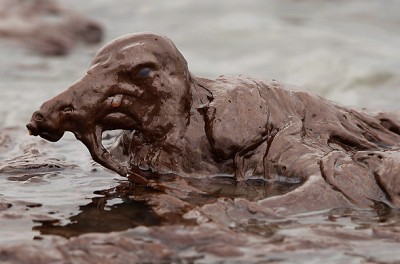
OIL SPILL
Most commonly referred to as the “BP Oil Spill” but also known as the “Deepwater Horizon oil spill”, “BP oil disaster”, or the “Macondo blowout”. The oil spill started in April 2010, involving an explosion on the behemoth Deepwater Horizon drilling rig. Disastrously, it went on for three months despite the best efforts to stem the flow of about 60,000 barrels of crude oil per day into the Gulf of Mexico. The oil spill resulted in endless coverage in the media — news, analysis, discussion, interviews, discussions of the interviews, press statements, and even coverage of fake Twitter accounts.
The oil spill spun off some definitive words of its own. The nadir of this inane media saturation was surely the spill cam, a 24-hour camera that broadcasted the leak. For some time, footage from this camera was given a permanent spot in a small box at the bottom every news station, no matter what program was on at the time. What utility, entertainment value, or newsworthiness the spill cam provided is anyone’s guess (“Oh look, the blurry picture still shows some gushing fluid, which apparently is crude oil.”). Numerous failed attempts to stem the flow of the oil were extensively analysed. Many of them seemed like the engineers had run out of ideas and asked their five-year olds for suggestions. A popular one was the containment dome, the idea being to simply drop a big dome over the leak. Another one was the junk shot — which is where everyone realised that ideas were really running thin. The junk shot idea was to shoot junk (seriously, old tires, golf balls, and other debris) at the leak in the hope that the leak would simply get clogged. Works with sinks, hey?
The full impact of the oil spill on the environment, plants and animals is still unquantifiable.
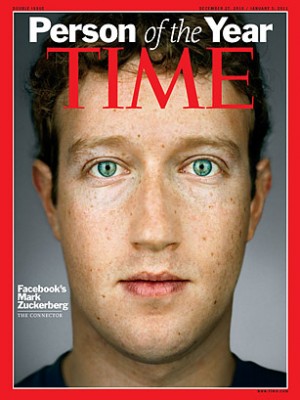
Launched in 2004, Facebook is not new. But 2010 saw Facebook in the limelight for both positive and negative happenings — from revamped profile pages, photo albums, groups and pages, through uproar over user privacy (debates about privacy were widespread, and are still on-going), to developments and rumours such as geolocation services, e-mail and even a Facebook phone.
There’s not much to be said that hasn’t been said about Facebook — its founder and CEO, Mark Zuckerberg, was awarded TIME’s Person of The Year Award — the joke being that he beat Julian Assange to the award because Facebook violated the privacy of more people than WikiLeaks did — but love it or loathe it, there is no doubting Facebook‘s influence on society.
And hey, how else would we remember birthdays, stalk our exes, spy on our friends (and not-so-friends) and harvest crops (or whatever the hell it is that you do on Farmville)?
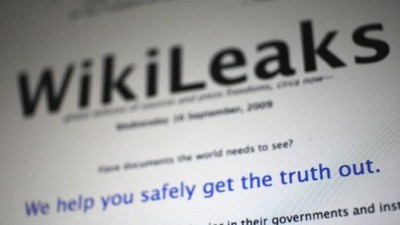
WIKILEAKS
Julian Assange introduced a new word (both verb and noun) to the world in 2010: WikiLeaks. The irrestible and seemingly unstoppable force that is WikiLeaks resulted in private correspondence and documents being purged into the public domain on an unprecedented scale. If information is power, then WikiLeaks is easily the most powerful force in history. The word “leak” hardly does justice to this irrestible dam-bursting flow of information.
There have been discussions over whether WikiLeaks is in fact good or bad.
Some say that the manner in which the information is disseminated (uncensored, unedited, in full) is irresponsible and could lead to the breakdown of the way nations deal with each other. Many say it is a beacon for the right to freedom of information, whilst others push back on this, saying that every right must be exercised responsibly. Many have spoken of the disintermediation of the news process — people can read the actual official documents instead of having their contents spun to them by journalists or analysts.
Admittedly, it is reasonable to suggest that the general public are not mature enough to digest highly-sensitive and potentially controversial information, and that the continued mass release of such documents may create chaos. Malaysia had its own experience of a WikiLeak when some statements made by Singaporean officials (including Senior Minister Lee Kuan Yew) to the effect that they believed that Anwar Ibrahim was guilty of the sodomy charges, having walked into a trap, were spun by some Barisan Nasional leaders and supporters as if it was conclusive evidence of Anwar’s guilt (er, some Singaporean officials said Anwar was guilty — so what?).
The jury is still out on Assange (not the most pleasant person by all accounts; his efforts are driven by arrogance and a strong hatred of authority and governments) and WikiLeaks, but it has undeniably shoved the “information age” to the next level.
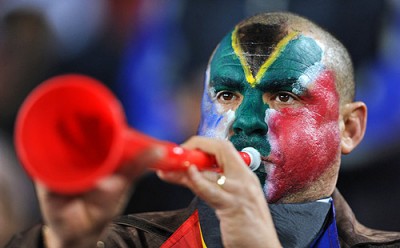
VUVUZELA
I recall watching the first match of the World Cup and thinking there was something wrong with my brand new television. What was that strange, low, hum-buzz sound? It sounded like a million locusts or bees were about to descend on the stadium. The world met the vuvuzela. Essentially a two-foot long plastic horn, the vuvuzela produces a loud (and I mean loud) monotone, and was the sound (some say noise) of the 2010 World Cup in South Africa.
The vuvuzela had been mentioned in the coverage of the 2009 Confederations Cup, but many thought “how bad can it be?” as we were quite used to having all sorts of instruments and air-horns in stadia for football matches. But the vuvuzela trumps all of those.
I had the misfortune of being in the presence of an actual vuvuzela for a couple of games which I watched at different mamaks (the instruments had made their way to Malaysia after a week), and it was only when I had heard the damned thing in person that I believed all the complaints that fans were going deaf, and that players couldn’t hear each other or the referee’s whistle in the stadium. The monstrous sound the vuvuzela produces is indescribable — like the kind of sound that would be made by an elephant which had eaten a jet engine and was currently having its leg amputated without anaesthesia. I’m not exaggerating. And that was only ONE vuvuzela.
Plastic horns aside, the World Cup was quite underwhelming football-wise, but the international attention and following that a World Cup attracts is still unprecedented by any other event in history. Football fans were introduced to the tiki-taka style of football by Spain (the Spanish club FC Barcelona employ the same style, but obviously do not enjoy the same scale of television coverage). I summed up my thoughts on the World Cup in my article “Tactics, Goals, Morality, and the Beautiful Game”.
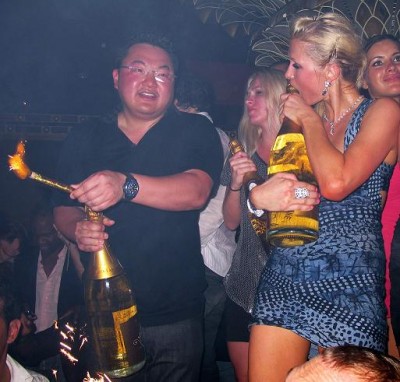
OTHER WORDS
A brief mention of some other words which defined 2010 would include Twitter or Twitterjaya, as it is increasingly commonly referred to. Malaysians became noticeably more active on Twitter, and it is definitely fast becoming a mainstream information channel, if it isn’t already.
Various financial terms continued to permeate the collective consciousness, most common of which was the double-dip recession — in any other year, the phrase “double-dip” would make me think only of ice-cream. There was, and continues to be, a lot of controversy about the nude scanners being used by airport security in the US. The only people who aren’t upset about these nude scanners are the snickering security officers.When it comes to technology, Apple products have hogged the limelight for several years now, and this year the iPad revived the concept of a tablet device, and every major manufacturer has since followed suit.
Musically, the young girl with the manly voice (Miley Cyrus) made way for the young boy with the girly voice, and Bieber mania was upon us, with a growing local posse of Beliebers. The incomparable Lady Gaga continued to provide the soundtrack of the year, and astound us with her outlandish outfits, none more so than the infamous meat dress.
Locally of course, there was no celebrity bigger than Jho Low, who even deigned to visit Malaysia and was afforded “hold the front page!” status by The Star.
On that note, here’s hoping that 2010 was good to you, and that 2011 will be even better — to give it the best possible start, why not usher in the new year Jho Low style, and pour ridiculously-expensive champers all over the place. Go on, you know you want to.
Marcus thinks that the Counting Crows’ “A Long December” is the best new year song, ever. The words that truly define his 2010 are “Bon Con”. He believes everything can be explained by the transperambulation of pseudo-cosmic antimatter. Follow his tweets at @vangeyzel — please check your over-sensitivities at the door.

Warao, Jho Low really showing his apek side, all fiery red!